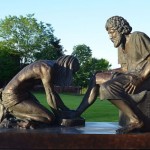 1 Corinthians 9:15-27
1 Corinthians 9:15-27
One of my favorite Woody Allen movies is Zelig, in which the humor is a little more subdued than in some of his others. In Zelig, Woody Allen plays a guy who is a human chameleon: that is, he becomes like whomever he is around. He becomes, in turn, many things, including a psychologist, a Native American, a Roman Catholic priest, and a Nazi.
In a very different way, St. Paul is a human chameleon. Though Paul never stops being Paul, he finds things in common with and finds a way to be able to share Jesus Christ with whoever is near him.
It’s true that Paul underwent one amazing transformation from Saul of Tarsus to Paul the apostle, and it’s this one crucial transformation that allows, even demands, that he expresses himself in different ways with different people. But the basic, fundamental St. Paul is the same. No matter whom he’s with, he considers himself first and foremost a servant of the Lord Jesus Christ and the Temple of the Holy Spirit, a steward of the mysteries of God, and a messenger of Jesus Christ.
Because Paul sees himself as the servant of Jesus Christ, he imitates his Master who served others and commanded Paul to be the servant of all. But being a servant of Jesus Christ who serves others requires that you really serve them, based on who they actually are and what they actually need. One of the hardest things to do as a disciple of Jesus Christ who wants to make other disciples of Jesus Christ is to determine what is best for others. Yes, I know that they need Jesus Christ, but how can I best bring Him to them?
To do this requires at least two things that are the mark of a servant of God, two things that require love on our part. First, to be a servant who serves others in a way they most easily receive Christ requires sympathy on our part. We have to care enough about the people we are trying to serve to try and see things from their point of view. The second thing that is required is that we give up what we might want to do for the sake of others.
I might find it most natural for me to approach others through their mind. Let’s have a little debate over the Resurrection or proofs for the existence of God. I might find that I like this way of introducing people to Jesus Christ. But what if they can’t see Him this way? Though my goal is to love them and serve them by bringing Christ to them, it’s important that I know who they are and how they best receive things.
I learned this lesson in the years I spent teaching at All Saints Episcopal School in Tyler, Texas. Previously, I had spent a few years teaching Good Shepherd School, the parochial school of Good Shepherd Reformed Episcopal Church, also in Tyler. Good Shepherd was a more thoroughly Christian environment where I blended in more easily and naturally, and it was also the Church where I was worshiping and eventually ordained deacon and priest.
But teaching at All Saints taught me a lot more about how to bring Christ to people because I had to get out of myself and learn to serve others in a way they could receive Christ. At All Saints I especially learned to become an All Saints Episcopal student to All Saints Episcopal students. It’s a lesson that prepared me more for being a priest than learning more theology or Greek or the theory of the cure of souls.
I remember a student by the name of Niles Ream, who I had in 7th grade and then 9th grade. One year he began to dress all in black (maybe it was the year I began to dress all in black, too – but for a very different reason!) He was a very quiet guy and obviously had a troubled life. Though he had a few friends, he often sat by himself before school in the hallway. One day, taking notice of him, I just sat beside him quietly for 5 minutes, saying only a few words. A few years later, when I was leaving All Saints to begin work on my Ph.D. in England, I realized that another teacher had noticed. I’m sure in his own way Niles did too.
After my first year of teaching at All Saints, the headmaster, Bill McGee, told me that because he thought I’d had a good year and established good rapport with the students, he had a challenge for me: he wanted me to teach Humanities to the first senior class the next year. Now Senior Humanities was a double class, combining English with both Government and Economics, and so I’d have these seniors for an hour and forty minutes in a row. This first senior class had made a reputation for themselves by being the most obnoxious, rebellious, “in your face” class the school had ever had. And I was to teach them for 2 periods back to back.
I remember spending the whole summer reading books on teaching and thinking about what I could do to recruit them and win them over. The first 6 weeks I tried some innovative ways of teaching I had read about that pretty much bombed.
But I tried some things that worked. I tried, especially, to show them that I loved them and wasn’t afraid of them. I made it a point to sit with them at lunch sometimes, even when I didn’t have lunch duty (you teachers will know what a sacrifice that was!) It crossed my mind that they were kind of like Jesus’ tax collectors and sinners.
Because I was teaching Government and Literature from an overtly Christian perspective, I had one guy who sat in the back of the class and whenever I’d tie together God and government or God and literature, he muttered under his breath “church. church.” By the end of the year, however, this class and I had grown to respect, and even be fond of, each other.
To the Jews, Paul became as a Jew, and to those without the law he became as one without the law. This is reflected in how Paul spoke to people he was trying to lead to Christ. To the Jews, he often argued from the Old Testament, but to the Greeks he quoted Greek philosophers (Acts 17 on Mars Hill is the classic example.)
“I have become all things to all men, that I might be all means save some” (verse 22.)
This is to be our attitude as well. We need to get out of the Christian ghetto sometimes and really engage the lives of those who don’t know Christ. They’re all around us, at work or school, at our clubs and associations, and they’re the WalMart cashier and your auto mechanic. Even those who say they are Christians are often without Christ and need us to become like them for the sake of the gospel.
It’s uncomfortable, and it takes time, effort, and experience. But there is no other way.
The way I figure it is like this: if God can become one of us to save us, then in order to be like God I’ll have to go out and become one of “them,” those without Christ. To serve God and to serve them, in other words to love God and to love them, I need to become one of “them.”
For this is the stewardship that God has given to us, and this is what it means to participate in Jesus Christ. And in going out to them, becoming all things to all people, that some may be saved, there is great joy and great reward.
Prayer: Lord Jesus Christ, I thank You that You became one of us that we might become part of You. Thank You for sending Your disciples into my life that I might be saved, and please give me the courage and wisdom to go out and share You with others. Help me to love as I have been loved and to be able to see past myself and my own comfort that by all means possible I might share You with those You’ve made my neighbors. Amen.
Point for Meditation:
What will it require you to give up in order to go out and share Christ with another person? Meditate on what God may be requiring of you in one particular circumstance, and spend some time thinking about that other person. How might he or she best receive Christ from spending time with you? By the way: sharing Christ doesn’t always mean evangelizing an unbeliever. We Christians need to receive Christ from each other as well!
Resolution: I resolve to consider one way that I might better become like one of “them” that I might more effectively show or tell them about Jesus Christ.
© 2013 Fr. Charles Erlandson











